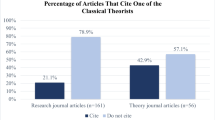Abstract
This short article is a response to that of Stahl (2013) who argued that there is an empiricist ‘bias’ in interpretive IS research, not justified by its philosophical roots in hermeneutics and phenomenology. Stahl calls for a wider range and quantity of non-empirical approaches. I am broadly supportive of this call but, in this response, I also argue for the value of studies based on empirical data. In addition, I think that Stahl overstates his empiricist case somewhat and I identify a range of existing non-empirical genres of publication including theoretical papers, literature reviews, polemics and future-oriented speculations. However, I do like the idea of extending non-empirical approaches and I suggest some ideas for the future including short stories and novels, plays and artistic comparisons. I end with a brief discussion of the feasibility of such ideas bearing in mind the politics of academic publishing.
Similar content being viewed by others
References
Benbasat I and Zmud RW (2003) The identity crisis within the IS discipline: defining and communicating the discipline's core properties. MIS Quarterly 27 (2), 183–194.
Boland RJ (1985) Phenomenology: a preferred approach to research on information systems. In Research Methods in Information Systems (Mumford E, Hirschheim R, Fitzgerald G and Wood-Harper T, Eds), pp 193–201, North-Holland, New York.
Desanctis G (1993) Theory and research: goals, priorities and approaches. MIS Quarterly 17 (1), vi–viii.
Emery JC (1989) Editor's comments. MIS Quarterly 13 (3), xi–xii.
Friedman T (2005) The World is Flat: A Brief History of the Twenty-First Century. Farrar, Straus and Giroux, New York.
Jones MR and Karsten H (2008) Giddens's structuration theory and information systems research. MIS Quarterly 32 (1), 127–157.
Klein HK and Myers MD (1999) A set of principles for conducting and evaluating interpretive field studies in information systems. MIS Quarterly 23 (1), 67–94.
Markus ML (1983) Power, politics and MIS implementation. Communications of the ACM 26 (6), 430–445.
Mingers J and Walsham G (2010) Towards ethical information systems: the contribution of discourse ethics. MIS Quarterly 34 (4), 833–854.
Orlikowski WJ and Baroudi JJ (1991) Studying information technology in organizations: research approaches and assumptions. Information Systems Research 2 (1), 1–28.
Robey D (2003) Identity, legitimacy and the dominant research paradigm: an alternative prescription for the IS discipline. Journal of the Association for Information Systems 4 (7), 352–359.
Rowe F (2011) Towards a greater diversity in writing styles, argumentative strategies and genre of papers. European Journal of Information Systems 20 (5), 491–495.
Stahl B (2013) Interpretive accounts and fairy tales: a critical polemic against the empiricist bias in interpretive IS research. European Journal of Information Systems, advance online publication, 12 February 2013, doi: 10.1057/ejis.2012.58.
Walsham G (1995) The emergence of interpretivism in IS research. Information Systems Research 6 (4), 376–394.
Walsham G (1997) Actor-network theory and IS research: current status and future prospects. In Information Systems and Qualitative Research (Lee AS, Liebenau J and Degross JI, Eds), pp 446–480, Chapman & Hall, London.
Walsham G (2005a) Development, global futures and IS research: a polemic. Journal of Strategic Information Systems 14 (1), 5–15.
Walsham G (2005b) Critical engagement: why, what and how? In Handbook of Critical Information Systems Research: Theory and Application (Howcroft D and Trauth EM, Eds), pp 225–243, Edward Elgar, Cheltenham.
Walsham G (2008) ICTs and global working in a non-flat world. In Information Technology in the Service Economy: Challenges and Possibilities for the 21st Century (Barrett M, Davidson E, Middleton C and Degross JI, Eds), pp 13–25, Springer, New York.
Walsham G (2010) ICTs for the broader development of India: an analysis of the literature. Electronic Journal of Information Systems in Developing Countries 41 (4), 1–20.
Walsham G (2012) Are we making a better world with ICTs? Reflections on a future agenda for the IS field. Journal of Information Technology 27 (2), 87–93.
Walsham G and Sahay S (1999) GIS for district-level administration in India: problems and opportunities. MIS Quarterly 23 (1), 39–66.
Author information
Authors and Affiliations
Corresponding author
Rights and permissions
About this article
Cite this article
Walsham, G. Empiricism in interpretive IS research: a response to Stahl. Eur J Inf Syst 23, 12–16 (2014). https://doi.org/10.1057/ejis.2012.57
Received:
Revised:
Accepted:
Published:
Issue Date:
DOI: https://doi.org/10.1057/ejis.2012.57




